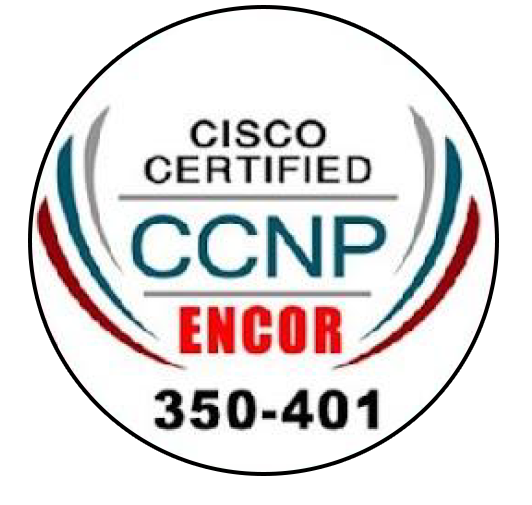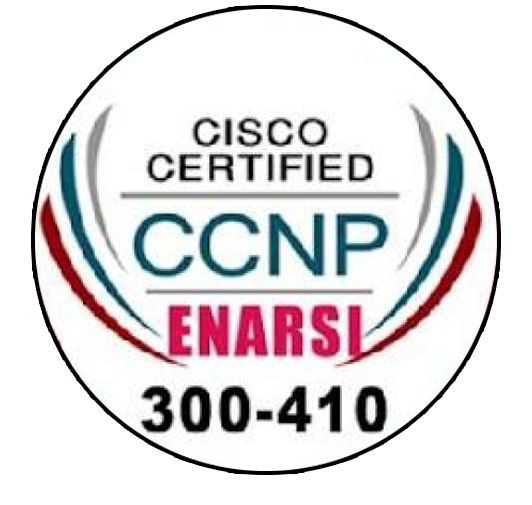Unlock Advanced Networking Skills with CCNP Certification at CTTI Computer Education, Mangalore! ISO 9001:2015 Certified. Expert Training, Placement Help, and Career Guidance for Your Networking Success.
The CCNP (Cisco Certified Network Professional) course is to equip individuals with advanced networking skills and knowledge, enabling them to design, implement, and troubleshoot complex network infrastructures. This certification validates a professional's ability to work with advanced technologies and solutions provided by Cisco, a leading networking technology provider. The CCNP course goes beyond the foundational skills covered in CCNA, delving into more intricate aspects of routing and switching, security, wireless networking, and collaboration.
Participants gain expertise in planning and managing robust and secure networks, making them highly qualified for challenging roles in network administration, engineering, and architecture. Additionally, the course aims to enhance problem-solving abilities, critical thinking, and hands-on proficiency in dealing with real-world networking challenges. Overall, the CCNP certification serves as a credential that demonstrates a high level of competence in the field of networking, opening up advanced career opportunities and contributing to the professional growth of individuals in the IT industry.
The implementing and operating CISCO Enterprise Network Core Technologies (ENCOR) training gives you the knowledge and skills needed to configure, troubleshoot and manage enterprise wired and wireless networks.
The implementing CISCO Enterprise Advanced Routing and Services (ENARSI) v1.0 gives you the knowledge you need to install, configure, operate and troubleshoot an enterprise network.


Earning a CCNP (Cisco Certified Network Professional) certification opens up a diverse range of job opportunities in the field of networking. Here are some of the key roles and positions that individuals with CCNP certification can pursue:
Network Engineer:
Design, implement, and manage network infrastructures to ensure efficient data communication.
Network Administrator:
Administer and maintain network systems, troubleshoot issues, and ensure optimal performance.
Systems Engineer:
Focus on the integration of networking solutions within broader IT systems and environments.
Network Analyst:
Analyze and optimize network performance, identifying areas for improvement and implementing solutions.
IT Consultant:
Provide expert advice and consultancy services to businesses seeking to optimize their network infrastructure.
Network Architect:
Design and plan complex network architectures to meet the specific needs of organizations.
Wireless Network Engineer:
Specialize in the design, implementation, and optimization of wireless networking solutions.
Security Consultant:
Focus on network security, ensuring the implementation of robust security measures to protect against cyber threats.
Cloud Network Engineer:
Work on the integration of networking solutions in cloud environments, ensuring seamless connectivity.
Voice Engineer (VoIP Engineer):
Specialize in Voice over Internet Protocol (VoIP) technologies, including the implementation of voice and video communication solutions.
Data Center Network Engineer:
Manage and optimize network infrastructures within data center environments.
Network Operations Center (NOC) Engineer:
Monitor and manage network operations, ensuring continuous functionality and rapid response to issues.
Telecommunications Specialist:
Work with telecommunications technologies, integrating them into network architectures.
IT Project Manager:
Manage projects related to network infrastructure upgrades, migrations, and implementations.
Network Training Instructor:
Share expertise by teaching and training aspiring networking professionals.
IT Support Specialist (Advanced Level):
Provide advanced technical support for complex network-related issues.
Network Manager/Director:
Oversee the strategic planning and management of an organization's entire network infrastructure.
CCNP-certified professionals are highly sought after in industries that rely on robust and secure networking, including telecommunications, healthcare, finance, and IT services. The certification validates advanced skills and expertise, making individuals well-positioned for challenging and rewarding roles in the dynamic field of networking.
CTTI Bonus Course — AI Tools for Everyday Work
Outcome: Learners acquire the ability to draft professional emails, summarize extensive materials, edit photos/graphics for slides, and make compact AI-generated videos, while using AI responsibly.
Module 1 — Writing Support with AI
• Practice formats for official mail, reminders, thanks, and client interaction.
• Exercise: draft 5 key emails + one personalized cover note.
• Assignment: compose a job application + resume; AI enhances it.
Module 2 — Summarization Skills with AI
• Extract highlights from long pages, blogs, and lectures. • Practical: condense a 15-min video & a 1,500-word text into one page. • Tools: learn prompts that improve clarity and factual accuracy.
Module 3 — Image Work with AI
• Change photo backgrounds.
• Add circles, highlights, and annotations.
• Generate AI-driven PPT slides.
Module 4 — AI for Video Production
• Prepare short scripts (30–90 sec).
• Add AI-based narration, animations, and compilation.
• Exercise: make one 60-sec project summary video.
Certification
• AI Skills Certificate on completion.